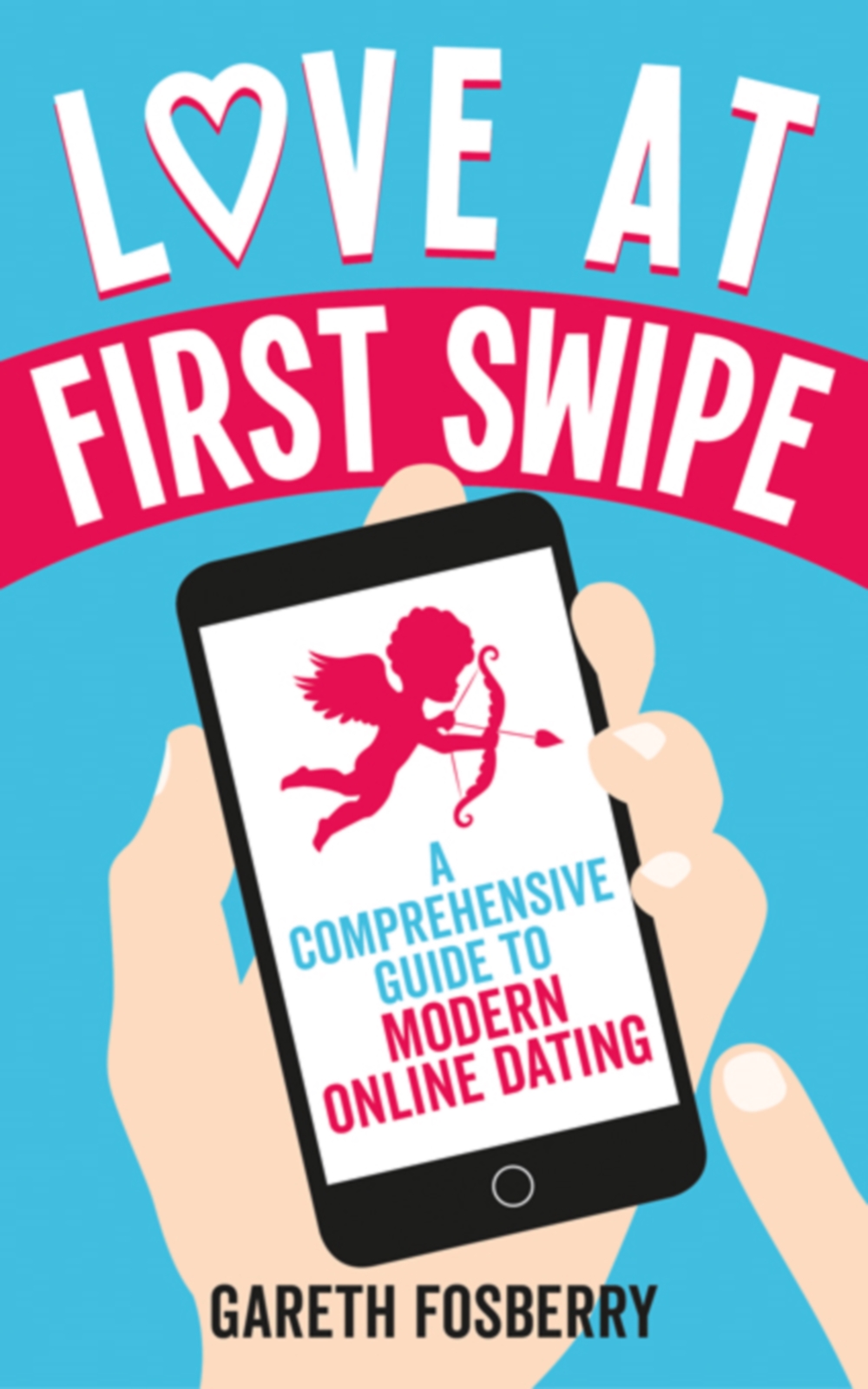Online dating can be a fun and illuminating experience - if you know how to avoid its darker side that is. Here, the British dating expert Gareth Fosberry reveals his top tips about catching that dream date... and avoiding the catfish. His new book, Love at First Swipe (Acorn Publishing), is out now.

Gareth Fosberry writes for Female First
With the advances in technology over the past 20 years, a quarter of people are now finding love online. This statistic is likely to increase to one-in-three over the next 15 years, due to the growing popularity of online dating.
On the whole, online dating is fun and exciting, a place where you can escape from normality and meet new people without having to leave the comfort of your bed or sofa. You have the ability to narrow down your search based on age, location, interests, lifestyle choices and values, meaning you can find people very quickly.
Online dating has created many more options and opportunities for us to meet new people, but as our lives become increasingly social media-dependent, there is a darker side of online dating that is growing rapidly.
There are many scammers out there who lie about who they are and what they want. It can be extremely difficult to recognise when someone is being deceptive and it’s quite easy to be misled by someone you have recently met online. Spotting a scammer can be very difficult.
You should be wary of anyone asking for your personal information. If another user asks you for your address, your place of work, information about your children, or for your financial information, do NOT give out this information. You might really like them or may think that you know them, but they are still a complete stranger. Also, don’t accept a Facebook friend request from anyone that you’ve just started to talking to.
A person pretending to be someone else makes up a different life story and uses photographs of unsuspecting victims to create fake identities. These people are known as “catfish”, and “catfishing” is the term used when someone creates a fake profile on a dating app or on a social media site, to trick people into thinking they are somebody else.
Catfishers add life experiences, jobs, hobbies, friends and photographs to their fake accounts. Catfishing is an extremely serious issue online and dating apps need to ensure that all their users are safe.
With catfishing, there are two types of victims: the people who are duped into trusting someone with a false identity; and those who have their personal photos stolen, which are then used by someone that is not them.
One report has found that romance scam victims in the United States and Canada lost nearly USD $1 billion between 2015 and 2018. It’s estimated there may be more than one million victims of romance scams in the United States.
The biggest indicator that you’re chatting to a catfish is their unwillingness to meet you in real life. If the person you’re chatting to online constantly comes up with excuses as to why they can’t meet you, it could mean that you're chatting to a catfish.

My top 10 tips for staying safe & secure when dating online
1) Build up a connection with someone online first and find out more about them. Never agree to meet someone straight away as you don’t know anything about them. In addition to the safety aspect, you may not be on the same wavelength and could be wasting your time, energy and money.
2) Don’t send money or talk about your finances to anyone you meet online – for any reason. If your online connection asks for money, you should treat this as a scam. There are many smooth talkers who are swindlers that want to steal your hard-earned cash. Don’t let them!
3) Take great caution when posting photos. Don’t post photos with your home or workplace in the background, nor pictures of your children or anyone else’s children. Check your pictures before you post them.
4) Don’t send any naked pictures to anyone you haven’t met, as you don’t know what they will do with them. Once you’ve sent them, you lose control of them and they could end up anywhere.
5) Always meet in a public place. Let a close friend or family member know when and where you’re going on a date and who you're going with.
6) Don’t get too drunk and don’t leave your drinks unattended at any stage. If you go for a comfort break, make sure you’ve finished your current drink first. If your date offers to buy you a drink, make sure you watch them when they’re being served, as there’s a growing number of cases of date rape, which occurs when your drink has been spiked.
7) Most dates are fun and enjoyable but if you ever feel pressured into doing something, or feel threatened in any way, tell someone. Whether you call a friend or family member whilst on a date, or whether you tell a member of staff in the venue of choice. Tell them you need their help to call you a taxi or get you out of there!
8) Make sure you practise safe sex and use contraception. Men should always wear a condom. The last thing you want is children with your date, as a result of what could turn out to be a one-night stand! Also, you don’t want to contract an STD (sexually transmitted disease).
9) Don’t meet up with anyone with NO photos on their profile, or anyone with just ONE photo uploaded. You should ask yourself, “What’s wrong with them?”. They may also be married, a scammer, or an escaped convict!
10) Tread carefully if chatting to anyone with nothing written in their profile. This person might be worried about giving out too much information for security reasons. They may also be new to online dating and not had the time to write their profile yet. Having said that, it’s always best to chat to someone who has something in their profile, as they are less likely to be hiding something and you can see if you have things in common.

Gareth Fosberry is one of the UK’s most respected online dating experts. His new book, Love at First Swipe, is a comprehensive guide to modern online dating. It offers tried and tested tips and advice about all important aspects of online dating, including personal safety and the ways to maximise your chances of dating success. It also has specific sections for disabled people and the over-50s. It is available now on Amazon UK priced £8.99 in paperback and £3.99 as an ebook.
We grab five (more) minutes with Gareth in a bid to cast more light on the murky world of internet dating…
Female First (FF): Online dating may have lost its stigma but how successful is it really?
Gareth Fosberry (GF): One in four people are now finding love online, whilst one in five married people in the US met their partner online. This proves how successful online dating has become and why dating app designers are constantly coming up with new ways of keeping users engaged.
FF: What are the benefits of online dating over speed dating and introduction agencies?
GF: Speed dating is actually a form of online dating as you have to register online, but the main benefit of normal online dating over speed dating is that you have more choice and can narrow down your search better.
FF: You’ve been online dating for over 15 years. How has the industry changed or evolved in that time?
GF: The explosion in the usage of smartphones over the past 15 years has been the biggest influence on the online dating industry. Users can now chat to new people instantly with one swipe of their index finger. You only had access to online dating through a computer 15 years ago. There are now over 7,500 dating apps out there that you can choose from. The growth of the internet and increased usage of social media and dating apps has helped make the world a smaller place. You can narrow down your search based on age, location, interests, lifestyle choices and values, meaning you can find people quickly and find people who match your specifications.
FF: What type of person is most likely to find true love online?
GF: The type pf person who is most likely to find true love online is someone who doesn't lie, someone who likes romance, has a kind heart and someone who is settled in their life and knows what they want. Also, most people have been hurt in the past and had their fingers burnt when trying to find love, so the person who can more easily "let someone in" is more likely find love.
FF: The internet is rife with scammers. How has the online dating industry responded and has it done enough?
GF: More could be done by online dating apps and sites to stop scammers and catfishers. Vetting needs to be much better than it currently is, as anyone can set up a fake profile on most dating apps and sites. Identity Verification is one way of putting an end to Catfishing, as I explained in my feature.
FF: Most of us will have heard of ‘catfish’. Is catfishing a bit of fun or something more sinister?
GF: The term "catfishing" is not a fun term at all. It is an extremely serious problem and threat. A person pretending to be someone else normally uses false pictures, or they lie about their background and their life story. These people are known as “catfish”, and “catfishing” is the term used when someone creates a fake profile on a dating app or on a social media site, to dupe people into thinking they are somebody else. They make up a different life story and use photographs of unsuspecting victims to create fake identities. Catfishers add life experiences, jobs, hobbies, friends and photographs to their fake accounts.
FF: The online dating industry is worth billions. Where will it be in 10 and in 20 years as technology and free apps become commonplace – bigger and more powerful or yesterday’s news?
GF: Technology will only advance further in the next 10 - 20 years. I predict that one in three people will find love online in around 10 years’ time. At present, the current statistic of one in four people finding love online is significantly higher amongst the millennial generation.
FF: What’s the single most important tip about online dating you can offer readers?
GF: My single most important tip that I can offer is to upload photos of yourself and create a profile which shows you in a good light and reflects who you truly are. Don't lie as people need to imagine how they would fit into your life. Be yourself as people need to accept you for who you are.

Book Review: Love At First Swipe
Whatever you’re after - from feet or fetish to love and romance - Gareth Fosberry’s new book gets to the heart of what works and what doesn’t in the world of online dating.
By Lucy Bryson
Whether you’re looking for a new Mr Right or just a flirty fling, Cupid now has an app to help. Unfortunately, however, Cupid’s new digital arrows don’t always hit the target.
Thankfully, Gareth Fosberry’s new book is here to help. Love at First Swipe: A Comprehensive Guide to Modern Dating (out now) sets out to arm singletons with the know-how and insider knowledge they’ll need to keep Cupid’s arrows straight and true.
Fosberry, a relationship guru, draws on his own dating experiences over some 15 years to help dating newbies and swipe-weary veterans get the most out of their online dating experiences. It’s a handy guidebook that sets out to educate readers about the nuances of online flirting and to arm them with knowledge they need to find love (or lust) in an increasingly confusing world of online dating. It also weighs-up the seven most popular apps on the market, which for first-timers is especially useful. Perhaps most importantly of all, it includes practical information about how to stay safe and secure in the process.
As its title suggests, this book leans towards helping people who are looking for long-term love online. But it also shows readers how to make every date as much fun - for both parties - as possible. Its ultimate aim is to help singletons expedite the search - or, as Fosberry puts it, to help them avoid a situation where trawling through potential dates becomes a “second, full-time job”.
He recommends, for instance, taking the time to get to know someone well online before agreeing to meeting up in person (the astonishing average cost of a first date in the UK makes that a sound financial move, if nothing else!) and also sets out practical tips on what descriptive words are most likely to make men and women swipe right (interestingly, these include ‘physically fit’ and ‘outgoing’ for men; ‘ambitious’ and ‘thoughtful’ for women) as well as looking at dating etiquette such as ‘the ex-factor’ (don’t mention the ex on a first date! Just don’t!) and when it’s appropriate to go Dutch.
His advice won’t ring true for every reader, but there’s a wealth of good information – especially about safety - to consider before uploading that new profile picture or agreeing to that coffee or glass of wine. Here’s where Love at First Swipe comes into its own: it helps readers recognise the warning signs of a scammer, serial dater, scary stalker or any other online undesirable. As well as handing out common sense tips - (sexy photos shared too soon can fall into the wrong hands, don’t divulge your financial details, only arrange meetings in public places) - Fosberry gives clear, practical advice about checking privacy settings, in order to avoid accidentally revealing more about yourself than you bargained for. Some of the statistics he quotes are scary: “In a recent study of nine online dating apps by Kaspersky Internet Security, their researchers discovered that four of the nine they investigated allowed potential criminals to work out who was hiding behind a nickname, based on data provided by the users themselves. For example, Tinder, Happn and Bumble let anyone see a user’s specified place of work or study”.
Then there’s the dating horror stories. Love at First Swipe doesn’t disappoint thanks to an entire section devoted to the subject. One reads, “He started saying ‘I can’t do this! Flung £40 in notes on the table and walked out. I began crying myself and was consoled by my pupil and my friend”.
And that’s before we get to the subject of the rise in STDs that has been attributed to the rise in popularity of online apps. Stay safe out there, ladies!
But although it pays to be cautious, Love at First Swipe is essentially a positive book aimed at helping people of all ages, genders and sexual orientation (including single parents, the over-50s and the disabled) avoid the potential pitfalls and get the most out of online dating. Newbies will be pleased to hear that it also explains ‘ghosting’, ‘catfishing’ and other dating terminology.
As the book points out, looking for love can be full of ups and downs, but as long as you’re securely strapped in, it should be a fun ride.
In short, if you’re already dabbling in online dating already or thinking of giving it a try, this is the book to read. Here’s to happy, safe online dating everyone!
Love at First Swipe by Gareth Fosberry (Acorn Publishing) is out now on Amazon UK, priced £8.99 in paperback and £3.99 as an ebook. Visit https://loveatfirstswipe.online/
Tagged in Dating Tips

